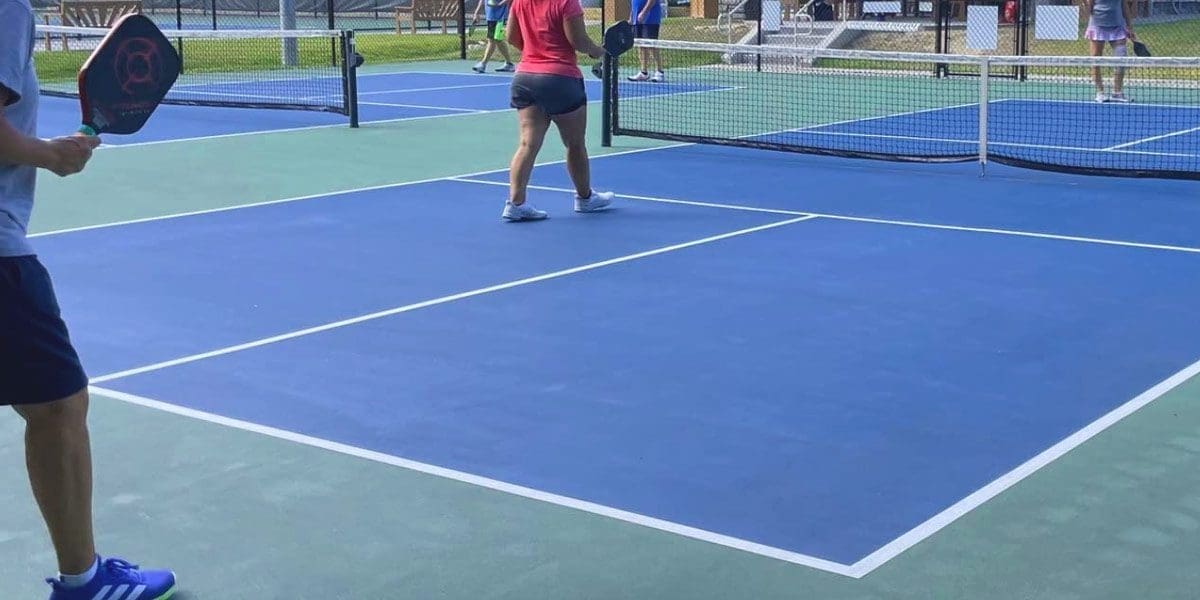Pickleball is more than a sport; it’s a gathering spot for a community built on sportsmanship, camaraderie, and of course, an unwritten code of court etiquette. This guide peels back the pickleball veneer, revealing the intricacies of pickleball etiquette and the unwritten rules that keep the game exciting and enjoyable for both new and experienced players. Whether you’re stepping onto the pickleball court for the first time or an experienced hand seeking to refine your sportsmanship, understanding the etiquette of pickleball can go a long way in enhancing your enjoyment of the game.
1. Call Out The Score Loudly
In pickleball, the score isn’t just a whisper between teammates; it’s a broadcast to all players. Good sportsmanship and proper etiquette mean calling out the score loudly and clearly. This simple act keeps everyone on the same page, eliminates confusion, and promotes fair play.
Remember, when you call out the score, make it loud enough for all players on the court to hear. This keeps the game flowing smoothly and ensures everyone is on the same page.
2. Understand The Unwritten Rules Of Court Etiquette
There are several unwritten rules when it comes to pickleball court etiquette. For instance, if a pickleball ball from another court rolls onto yours, it’s proper etiquette to stop play, shout “ball on court,” and return the ball to the adjacent court.
Additionally, if you need to cross another court during play, wait for a break in their game before you pass. These gestures of good sportsmanship show respect for the game and other players.
3. Master The Art Of The Lob
Knowing when and how to lob the ball in pickleball can make a significant difference in your game. However, the etiquette of the lob isn’t always clear to new players. Remember, it’s not just about winning; it’s about enjoying the game.
Never lob the ball when it can endanger other players, especially those on adjacent courts. When in doubt, don’t take advantage of a risky lob. It’s better to lose a point than to disrupt another game.
4. Meet At The Net With Graciousness
Win or lose; it’s important to meet at the net with graciousness after a game. Make eye contact, congratulate your opponents, and thank them for the game. This is one of the fundamental unwritten rules of pickleball, fostering camaraderie and good sportsmanship among players of all skill levels.
5. Lessons On The Court: Respect The Game
The pickleball court can be a great place to learn, but it’s essential to remember that during open play, it’s not a place for formal lessons. If someone gives you advice, accept it with grace. If you see someone struggling, offer tips with kindness. Never use another player’s mistake as an opportunity to grandstand or belittle. Remember, we’re all here to enjoy the game and improve.
6. Keep The Game Flowing
Keeping the game flowing smoothly is key to maintaining a fun and enjoyable atmosphere at the pickleball club. Don’t unnecessarily delay the game by arguing over line calls or taking excessive time between points. In a recreational setting, giving your opponent the benefit of the doubt on close line calls is a sign of good sportsmanship.
In tournament play, official rules come into effect, but the underlying principles of respect and fairness still apply.
7. Respect The Pickleball Club Etiquette
Whether it’s recreational play or tournament play, respect the pickleball club etiquette. Do not monopolize courts if people are waiting. Understand the rules of the game, and more importantly, understand the specific rules and etiquette of your pickleball club. This includes respecting the equipment, courts, and fellow players.
8. Sportsmanship Guide: More Than Just Rules
Pickleball sportsmanship extends far beyond following the official rules. At its core, it’s about respecting your fellow players, regardless of skill level. In practice, this means playing fair, being gracious in both victory and defeat and understanding that everyone has a different learning curve.
Playing against a new player? Don’t play “keep away,” targeting the weaker player to score easy points. Not only is it against the spirit of the game, but it’s also a surefire way to stifle the joy and enthusiasm of someone new to the sport.
9. The Role of the Paddle: Etiquette Off The Court
The pickleball paddle is an extension of the player, and how you handle, it speaks volumes about your regard for the game. When not in play, rest your paddle on your side of the court. Don’t toss or mishandle it out of frustration or disrespect.
If a ball from another game lands on your court, stop play and raise your hand to signal disruption. Then, using your paddle, return the ball to their court, preferably without entering the play area, to minimize disruption.
10. The Unwritten Rules of Open Play
Open play is a staple in the pickleball community, providing a chance for players of all skill levels to enjoy the game together. However, there are unwritten rules to maintain a fun, respectful atmosphere.
For instance, if several players are waiting to play, it’s good sportsmanship to limit your games to one and then rotate out, giving others a chance. And remember the etiquette of “don’t cross a court during a game” applies just as much during open play as in tournament settings.
11. Club Etiquette: Fostering a Respectful Community
Club etiquette is key to fostering a harmonious pickleball community. Respect the rules of the club, including court scheduling, noise levels, and general cleanliness. If you’re unsure about any aspect of club etiquette, don’t hesitate to ask.
Remember, a pickleball club isn’t just about the game; it’s a social hub where friendships are forged and experiences shared. Participating actively and respectfully goes a long way in enriching the experience for everyone.
12. Experience and Etiquette: The Evolution of a Player
As an experienced player, you hold a critical role in upholding pickleball etiquette. New players will look to you for guidance, and your actions set the standard for good sportsmanship.
From always giving the benefit of the doubt on those close line calls to offering supportive advice to new players, your actions shape the culture on the court. Embrace this role, and remember the thrill of your early days as a player.
13. Keep the Game Going: The Art of Perseverance
In pickleball, as in life, not all games will go your way. A crucial part of pickleball etiquette and sportsmanship is the art of perseverance – the ability to keep the game going, regardless of the score.
When faced with adversity, be it a tough opponent or a string of lost points, remember why you play the game. Keep the spirit of fun alive, and no matter the outcome, always meet at the net with a smile.
Let’s recap:
- Always call out the score loudly and clearly.
- Follow the unwritten rules of court etiquette.
- Master the art of the lob, but never endanger other players.
- Meet at the net with graciousness, whether you win or lose.
- Use the pickleball court as a place for learning, not belittling.
- Keep the game flowing, showing respect and fairness to all players.
- Embody the spirit of pickleball sportsmanship by respecting players of all skill levels.
- Handle your paddle with care, both on and off the court.
- Understand the unwritten rules of open play to keep the game fun and inclusive.
- Uphold the rules and spirit of your pickleball club to foster a harmonious community.
- As an experienced player, model good sportsmanship and support new players.
- Respect the specific etiquette of your pickleball club.
- Lastly, persevere through tough games and always keep the spirit of fun alive.
Mastering pickleball etiquette may seem daunting at first, but once you understand its importance and how it enhances the game, you’ll find it becomes second nature. As with all sports, pickleball is best enjoyed when players show respect and sportsmanship, so the next time you step onto the court, remember these etiquette tips and enjoy the game to its fullest.
From the basics of calling out the score to understanding the unwritten rules of open play and club etiquette, pickleball etiquette is a multifaceted concept. It’s not just about following the official rules; it’s about respect for the game, the players, and the community that surrounds it. It’s about handling your paddle with care, demonstrating good sportsmanship, and fostering a supportive and respectful club atmosphere. But most importantly, it’s about ensuring that regardless of skill level or experience, everyone is afforded the same joy and respect on the pickleball court. By embracing these facets of etiquette, you’re not just becoming a better player; you’re upholding the very spirit of the game. Happy playing!
Q: What’s the basic pickleball etiquette I need to know as a new player?
A: Great question! When you’re just starting out, the basics include making sure to always call out the score loudly and clearly before serving. On the court, if a ball from another game rolls onto your court, shout “Ball on court!” and stop playing. Don’t cross another court during a game – wait until their play stops. If you’re unsure whether a ball is in or out, give your opponents the benefit of the doubt. Off the court, good sportsmanship is key. Congratulate others, win or lose, and always show respect to all players, no matter their skill level.
Q: How does court etiquette apply in pickleball?
A: Court etiquette is vital in pickleball. It includes calling out the score loudly before each serve, respecting line calls, and not crossing onto another court during a game. If a “ball” comes onto your court, stop play, retrieve the ball, and return it without disrupting the game. Court etiquette also extends to the sidelines. If you’re waiting to play, don’t disrupt ongoing games. Always practice good sportsmanship, too – it’s an unwritten but essential rule of court etiquette.
Q: What are the unwritten rules of pickleball?
A: Unwritten rules are integral to pickleball etiquette. They’re not found in the official rules of pickleball, but they’re understood and respected by all players. These include not taking advantage of new or weaker players, not crossing another court during a game, and shouting “ball” if one rolls onto your court. Always practice good sportsmanship – it’s not about winning at all costs but about enjoying the game and treating everyone with respect.
Q: What’s the etiquette during open play pickleball games?
A: Open play is a common part of the pickleball community, and it has its own unwritten rules. For example, if several players are waiting, limit your games to one before rotating out. Also, it’s important to respect players of all skill levels. Whether advanced or new to the game, everyone is there to have fun. Lastly, if a ball from an adjacent court rolls onto yours, stop play and return the ball, shouting “ball on court” to alert other players.
Q: How should I behave in a pickleball club regarding etiquette?
A: As a member of a pickleball club, you’re expected to respect both the official rules and the unwritten etiquette of the club. This includes scheduling your court time properly, maintaining noise levels, and keeping the club clean. A pickleball club isn’t just about playing the game; it’s a social sport where friendships are made. Actively and respectfully participating enhances the experience for everyone.
Q: What are some etiquette tips for experienced pickleball players?
A: Experienced players have a key role in upholding pickleball etiquette. You set the standard for good sportsmanship, especially for new players. Always provide the benefit of the doubt on close line calls, offer friendly advice to new players, and remember, everyone’s there to have fun. Keep the spirit of the game alive, regardless of the competition level.
Q: What’s the proper etiquette when a ball from another game lands on my court?
A: If a ball from an adjacent court rolls onto yours, the proper etiquette is to shout, “Ball on court!” and stop playing. Then, retrieve the ball and return it to the players on the other court, ideally without walking onto their court, to minimize disruption. It’s a simple act that keeps games flowing smoothly and upholds the spirit of respect that’s so central to pickleball.
Q: What’s the etiquette when I need to cross a court during a game?
A: Good question! The golden rule is, don’t cross a court during a game. If you need to retrieve a ball or cross to another court, wait until their point is over. Raise your hand to catch their attention, then quickly cross when acknowledged, ensuring you don’t disrupt ongoing play.
Q: What does “calling out the score loudly” mean in pickleball etiquette?
A: In pickleball, the server is responsible for calling out the score before each serve. This should be done loudly and clearly enough for all players, and even spectators, to hear. It’s an important part of the game’s etiquette, ensuring everyone knows the state of play and minimizing confusion or disputes.
Q: How does good sportsmanship fit into pickleball etiquette?
A: Good sportsmanship is the backbone of pickleball etiquette. It’s about fair play, respect, and graciousness, both on and off the court. This means giving the benefit of the doubt on line calls, offering encouragement to players of all skill levels, and, importantly, remembering that the goal of the game is enjoyment for all.
Q: What is the etiquette for handling the paddle in pickleball?
A: Your paddle is an extension of you on the court, so handle it with care. Don’t toss it or mishandle it out of frustration. When not in play, place it on your side of the court. Using the paddle, you can also return a stray ball from another court without walking onto their court, minimizing disruption.
Q: How can I maintain etiquette during a pickleball tournament?
A: Competing in a pickleball tournament brings its own set of etiquette guidelines. Of course, the fundamentals still apply: call the score, respect line calls, and uphold good sportsmanship. Additionally, be punctual for your games, handle your paddle with care, and respect the decisions of referees and officials. Even in a competitive setting, remember that the heart of pickleball lies in camaraderie and enjoyment.
Q: How should I react when a call is disputed in pickleball?
A: Disputes can sometimes happen in pickleball, but they should be handled calmly and respectfully. If there’s a disagreement over a line call, the benefit of the doubt typically goes to the opponent. If a dispute continues, some games may have a referee to make the final call. Remember, maintaining the fun and friendly spirit of pickleball is more important than a single point.
Q: What’s the etiquette when a serve hits the net in pickleball?
A: If a serve in pickleball hits the net but still lands in the appropriate service box, it’s considered a “let” and the server gets to re-serve. No point is scored, and it’s not a fault. The server should simply announce “let” and serve again. This is another instance where clear communication comes into play in pickleball etiquette.
Q: What should I do when I see a player not following etiquette?
A: If you notice a player disregarding the unwritten rules of pickleball etiquette, it’s usually best to address it politely and privately. If the player is new, they may simply be unaware of these guidelines. More seasoned players may need a gentle reminder. Remember, the goal is to maintain a fun and respectful environment for all.
Q: What does it mean to ‘respect the paddle’ in pickleball?
A: Respecting the paddle is a part of pickleball etiquette that focuses on the way players handle their equipment. This means not throwing or mishandling your paddle out of frustration or neglect. It should be placed safely on your side of the court when not in use. It’s a sign of respect for the game, your equipment, and your fellow players.
Q: How can I show good sportsmanship after losing a game?
A: Good sportsmanship shines brightest in moments of defeat. Even after losing a game, it’s important to be gracious. Congratulate the winners, shake hands, and thank your partner and opponents for the game. And remember, each loss is an opportunity to learn and improve. In pickleball, the community and camaraderie are just as important as the competition.
Q: How should I handle line calls when playing pickleball?
A: Line calls can be a tricky part of pickleball, but they’re crucial to the game. When calling lines, be fair and honest. If you’re unsure, it’s standard practice to give the benefit of the doubt to your opponents. Good sportsmanship and respect for other players are vital here, reinforcing the friendly, community-driven spirit of the game.
Q: What is pickleball etiquette?
A: Pickleball etiquette refers to the unwritten rules of sportsmanship and court etiquette that players should follow while playing pickleball. These rules help ensure a fair and enjoyable game for everyone involved.
Q: Can you explain some basic pickleball etiquette rules?
A: Sure! Some basic pickleball etiquette rules include not shouting “ball” unless there is a legitimate risk of collision, not switching balls during a game, and congratulating your opponents on good shots or plays.
Q: Is there a specific rulebook for pickleball etiquette?
A: While there is no official rulebook solely dedicated to pickleball etiquette, there are guidelines and unwritten rules that most experienced players follow to maintain a positive and respectful playing environment.
Q: What should I do if a ball lands on my court during play?
A: If a ball from another court lands on your court during play, you should pause the game, shout “ball on court,” and wait for the players from the other court to retrieve their ball before continuing.
Q: Are there any specific etiquette rules for playing a game with advanced players?
A: When playing with advanced players, it is important to be respectful and acknowledge their skill level. Avoid underestimating them and maintain a high level of sportsmanship throughout the game.
Q: What should I do if many players are waiting to play?
A: If many players are waiting to play on the court, it is courteous to limit your play time and give others a chance to participate. Consider playing shorter games or taking turns with other players.
Q: Are there specific etiquette rules for recreational pickleball?
A: Yes, in recreational pickleball, it is common courtesy to let the players who have been waiting for the longest play next. This promotes fairness and ensures that everyone has an opportunity to enjoy the game.
Q: Are there any etiquette rules specific to playing on two courts?
A: When playing on two courts that share a center line, it is important to be mindful of the other players’ space. Avoid crossing the center line unless necessary, and try to minimize any interference with players on the adjacent court.
Q: What should I do if a ball is rolling towards me from another court?
A: If a ball is rolling towards you from another court, it is polite to stop it with your paddle and return it to the players on that court. This shows respect for their game and prevents any disruption.
Q: Are there any specific etiquette rules for older players?
A: When playing with older players, it is important to be considerate of their skill level and physical abilities. Avoid hitting the ball too hard or smashing it in a way that may be difficult for them to return.



